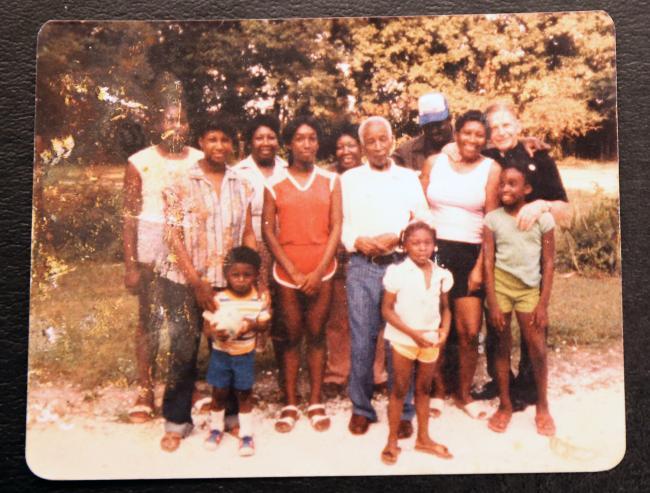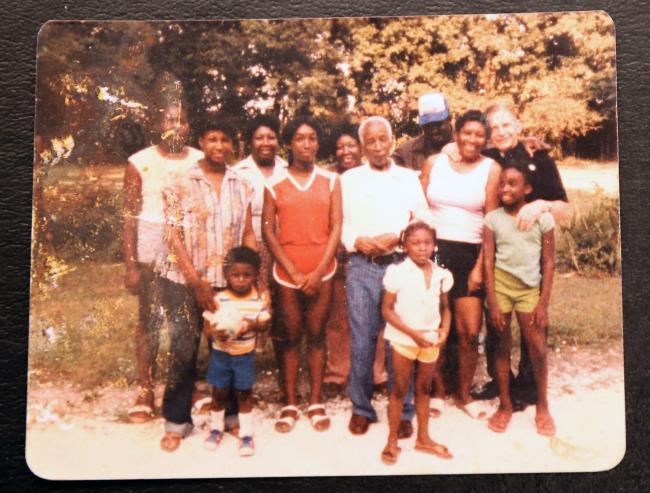Descendants of the GU272+ joined Georgetown University’s Department of African American studies Feb. 2 for a conversation on the legacy of the GU272+: the 314 enslaved people the Maryland Jesuits, who operated Georgetown in 1838, sold to financially sustain the university.
Adam Rothman, history professor and principal curator of the Georgetown Slavery Archive, a repository of materials relating to GU272+, moderated the event, which focused on the development of the GU272 Memory Project, an organization dedicated to tracking the ancestry of the enslaved people affiliated with Georgetown and honoring their legacy in the community.
Rochell Prater and Carlos Scott, two GU272+ descendants, led the discussion.
“I want to thank our ancestors really for their resilience, their intestinal and spiritual fortitude, their formidable courage,” Scott said at the event. “I know they could not see a day like today or a night like tonight happening. But man, this is really special. And I’m so proud to be a part of it.”
Prater said that after experiencing so much familial loss and grief in her life, finding out that she was a part of the GU272+ network through a 2016 The New York Times article was life-changing.
“To me, it felt like I had hit the lottery,” Prater said at the event. “Not a monetary lottery. Hear me, right? I had family, y’all. I had family all over the place.”
Prater and Scott grew up in Maringouin, La., the same region where Maryland Jesuits sold their ancestors and around 314 other enslaved people in 1838. The sale amassed $115,000, equivalent to about $3.3 million today, in what was one of the largest sales of human beings in U.S. history. The Jesuits then used the profits to pay off their debts and fund the development of Georgetown University.
In response to this history, Georgetown University President John DeGioia (CAS ’79, GRD ’95) formed the Working Group on Slavery, Memory, and Reconciliation — a group dedicated to exploring the university’s past involvement with the institution of slavery — in September 2015. The establishment of this group followed the reopening of Mulledy Hall and McSherry Hall, named for Rev. Thomas F. Mulledy, president of Georgetown who managed the sale, and Rev. William McSherry, former Georgetown president who served as Mulledy’s lawyer during the sale.
In November 2015, DeGioia approved the renaming of Mulledy and McSherry Halls following student protests and a recommendation from the Working Group on Slavery, Memory, and Reconciliation. The university temporarily renamed the buildings Freedom and Remembrance Halls, before renaming them in 2017 to Isaac Hawkins Hall, after the first enslaved person recorded in the 1838 sale, and Anne Marie Becraft Hall, a pioneer Black educator.
In April 2019, 66.1% of students voted to establish a $27.20 semesterly fee to go toward a fund that would benefit GU272+ descendants. The university did not implement the fee but instead announced its intention in October 2019 to form community-based projects about GU272+ before launching a Reconciliation Fund in October 2022.
Growing up alongside Prater in Louisiana, Scott said he often wondered about his heritage and how his family ended up in Maringouin.
“Like how did we get here?” Scott said. “Nobody had answers. We knew that nobody would, on their own, move to this place.”
When Prater broke the news to Scott that she is his biological cousin, Scott said it felt rewarding to finally get answers.
“It was a hard life,” Scott said at the event. “Well, who caused the life I was living? Our history had been erased, our people didn’t know. And so for a kid who grew up throwing rocks wondering, would I ever make it out of this place? It meant everything. It means everything.”
Scott, who now works as a pastor in Bowie, Md., said that he struggled with the idea that his ancestors were owned by priests, given his own faith.
“So people who were supposed to be the face of the pope were actually the face of hell, and they betrayed our people,” Scott said. “How do I process that? How do I handle that? I’ve learned from my mom, forgiveness is for me; if you hurt me, I need to forgive you so that I won’t be a prisoner to that situation.”
Scott said that education is essential in the preservation of historical stories like the GU272+.

“One of my big fears is that one day everybody will lose interest, and the knowledge will fade,” Scott said. “And two generations from now, another group of people are gonna have to rediscover this whole history for themselves. We don’t want to have that happen.”
Prater said schools like Georgetown must continue to raise awareness of Black history, especially given recent efforts by states like Florida to ban a new Advanced Placement course in African American studies.
“So I’m asking you to hold them accountable,” Prater said. “And make this a part of the curriculum, a part of the college tours, right up there beside [John] Carroll. This history needs to be right there.”
Scott said one way to ensure history is not forgotten is for Georgetown to publicly pay homage to its ancestors.
“I also would like to see a shrine. Something at Georgetown, where something can be constructed — a sculpture or torch that never goes out,” Scott said. “Something that tells people that the GU272 were here because our story really is a microcosm of what happened throughout this country.”





















